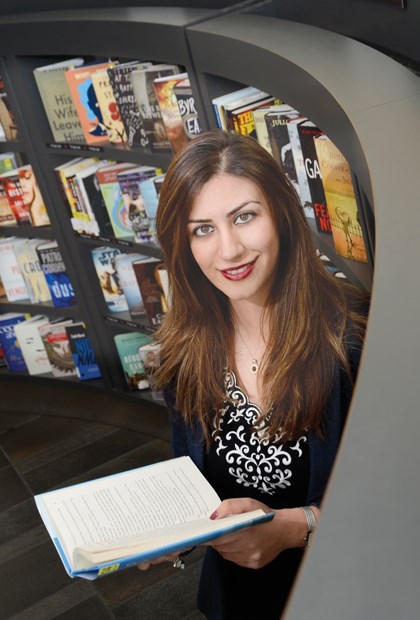When Shideh Taleban saw an advertisement for the Library Champions Project, something clicked.
"I had my Masters in Library Information Studies from Iran and I couldn't use it here because it was not American Library Association accredited," she says. "So when I saw the advertisement for library champions through the North Shore Multicultural Society. .. I thought that's a very good opportunity to just go and be involved in libraries."
The Library Champions Project was created by NewToBC, a project funded by the Ministry of Education and the Ministry of Jobs, Tourism and Skills Training, to help new immigrants get to know their local public library and in the process reach out to other newcomers in the community. "It was really rewarding. .. at that time maybe I was not that much familiar with the services that were available for people," said Taleban, 30, who came to Canada from Iran in 2009. "It was eyeopening for myself too and besides that it was really good for networking for me."
Ten public libraries in the Lower Mainland participated in the pilot project, which started in the summer of 2013, including the West Vancouver Memorial Library and North Vancouver City Library. The North Vancouver District Public Library is currently running through its first training session.
Taleban volunteered at the North Vancouver City Library, learning the ins and outs of the library and services available for newcomers.
"Being involved with different groups of people, different ethnicities and how to start a conversation even with a stranger, that's what I learned," she says.
Jane Watkins, chief librarian at the North Vancouver City Library, says the project was born out of a need for public libraries to be better known by newcomers in their communities.
"Generally, the libraries are dealing with new Canadians and settlement issues," says Watkins. "I think very often people didn't know what they could expect from their library and we actually do have lots of services to offer."
Watkins says they did a consultation in various community focus groups with newcomers.
"We found, one, that they didn't know much about libraries and library services," she says. "We also had the challenge of how to market to newcomers, whatever we were doing wasn't reaching them. So this project was born with those two pieces in mind."
Jenny Benedict, director of library services at the West Vancouver Memorial Library, says the genius behind the project was that they knew they had new arrivals coming to West Vancouver.
"We're very fortunate in that approximately 40 per cent of our residents have chosen to come here from other countries and in the last five years it's about 3,000 new arrivals," says Benedict. "We recruited library champions who were new arrivals or had been new arrivals and had discovered libraries and that had been part of how they had become integrated into the community. All of them that came had just such a passion for what a difference libraries had made in their own settlement to the community."
Library champions receive a Certificate of Achievement for completing their training, as well as work experience, increased communication skills, knowledge of library operations and a reference for time spent volunteering.
Branka Vlasic, a library champion trainer and facilitator at NewToBC, says they look for people who like libraries and are passionate about reading.
"You have to be really passionate about the library," says Vlasic. "(And) willing to spend three months volunteering as a library champion promoting libraries in the community."
Vlasic says library champions are trained to do outreach and promote library services and programs in their own communities.
"They actually go through three training sessions. The first training session is all about communication skills. .. mostly listening and public speaking and some cross cultural communication," she says. "We also talk about settlement, how difficult it is to be a newcomer and the change, the cultural change, the language and what are the joys of that change."
The second session involves a thorough orientation with the librarians.
"They talk about collections in the library, about different language collections, about the programs - especially programs related to newcomers and also the librarians always give the library tour to the champions," says Vlasic.
"The third session is mostly about outreach - really what's your personal outreach plan, where are you going to go, how are you going to be safe, how are you not going to cross the boundaries of what the library champion does and what the library champion doesn't do. So it's about the strategies, outreach planning and outreach safety guidelines."
Vlasic says the biggest challenge for the champions comes towards the end of training "when people exhaust their own contacts."
"They still want to do a great job, so they start meeting strangers, and that's never easy, it's kind of challenging," she says. "People tell me that they gained lots of confidence out of it. It's really hard to make up your mind to approach somebody you don't know."
Shideh, who has been working on her master's of library and information studies degree at UBC since January, started networking amongst her family and friends, then on campus.
"What was interesting for me was most of the university students, they were not aware of different services that were available in public libraries," she says. "I think it was eyeopening for most people."



